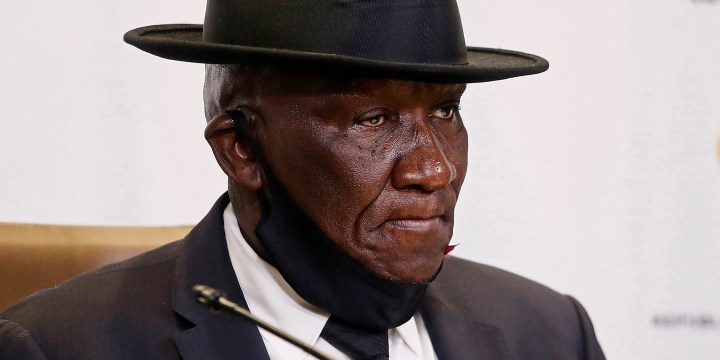CRIME STATS
Increase in rape and assault a grim marker of rising levels of gender-based violence

The 2019/20 crime statistics released on Friday 31 July paint a grim picture of the state of violence against women and children in South Africa.
In Ikageng, a township near Potchefstroom in North West, a sickening ordeal unfolded. A woman was raped in the bushes by 20 men, who took turns violating her. She and a friend were lured to smoke a pipe with gang members, one of whom was an acquaintance.
This is just one example of the increasing occurrence of rape and other forms of gender-based violence (GBV) portrayed in the crime statistics for the 2019/20 financial year – April 2019 to March 2020.
Another instance in Ngcobo, Eastern Cape, saw nine men enter a woman’s home and rape her for two days straight. One of the men was an acquaintance of the survivor.
According to the statistics, you are most likely to get raped in a private residence, be it your own home, a friend’s, a relative’s, the perpetrator’s home or that of a neighbour – 18,231 cases were reported from private residences, with the highest number in Limpopo. In all the provinces except for Western Cape, this was the highest incidence. Western Cape reported slightly more rape cases in public areas.
“South African men are greatly violent,” said Nokhetho Mhlanga, an independent researcher at Plus94.
“It is not unfounded that the domestic space is where they will enact their violence where there is less consequence and where they assume the dominant position.”
The statistics for intimate partner violence are not clear; however, the report showed that 22,864 cases of common assault by a boyfriend/girlfriend, ex-partner or a spouse were reported, 14,020 cases of assault with intent to inflict grievous bodily harm were recorded, while 817 cases of murder by the aforementioned perpetrators were documented.
With regards to femicide, an instance cited in the report is that of the murder of a woman and her three children whose home was burnt down by her ex-boyfriend in Harare, Khayelitsha.
The statistics do not include crimes reported during the hard lockdown, although there were reports that gender-based violence “surged” during this period with victims forced to remain at home with their perpetrators. According to Police Minister Bheki Cele, one week into lockdown more than 87,000 cases of gender-based violence were reported across the country.
“To contextualise the implications of lockdown on GBV: the violators who are often perpetrating at work, schools or in public spaces are now confined to their homes, so it is not unfounded that the violence will now move to a domestic setting. In addition, substance abuse, financial distress etc will agitate abusers and as a coping mechanism, they will take out their frustrations on those in their home,” said Mhlanga.
A rapid assessment conducted by associate professor of psychology at Wits University, Professor Mzikazi Nduna and Oyama Tshona during the March to May lockdown found that reports of intimate partner violence (domestic violence) increased despite the alcohol ban.
“With lack of data on alcohol use during the lockdown, it is difficult to delink this unexpected hike in domestic violence from alcohol use. Alcohol consumption may have continued in a number of places that could not be policed at the beginning of the lockdown,” the study read.
Overall, common assault against women was up by 0.6%, while attempted rape against children rose by 4.3%.
“Excessive and binge drinking in the early days of the lockdown may have accompanied the psychological panic in a way that mimics the ‘panic buying’ that was reported a few days before the lockdown came into effect,” it was also suggested.
The study also postulated that gender-based violence may not have increased during the lockdown, but more people were coming forward to report perpetrators.
Overall, sexual offences increased by 1.7%. Incidents of rape increased by the same percentage. In addition, rape and sexual assault made up 93.9% of the total number, of which rape was the primary contributor at more than 79%.
“I do not believe that the 1.7% statistic is a true reflection of the rise in sexual offences in South Africa. I believe that sexual violence is more prevalent. With regards to the rise, SA is a highly violent society which is compounded by the fact that it is a patriarchal society,” said Mhlanga.
Inanda in KwaZulu-Natal was identified as South Africa’s “rape capital”, followed by Umlazi, also in KZN. Although Mhlanga could not comment on the potential reasons behind this, Cele attributed the high incidence to alcohol consumption, saying the majority of the cases occurred as people were leaving shebeens. Both areas were also in the top five stations in terms of murder.
The statistics for crimes against women and children were not yet verified but it was reported that from the previous year, crimes against women decreased by 4.8% while crimes against children decreased by 6.4%. Gauteng had the most number of crimes against women, followed by Western Cape. For children, Western Cape had the highest number followed by KwaZulu-Natal.
Overall, common assault against women was up by 0.6%, while attempted rape against children rose by 4.3%.
“One of the by-products of patriarchy is violent masculinity wherein men engage in violent ways to assert their power, eg, sense of entitlement on the feminine body. In addition, there is a lack of ongoing responsiveness and dire consequences for those who perpetrate sexual violence,” said Mhlanga. DM


















 Become an Insider
Become an Insider